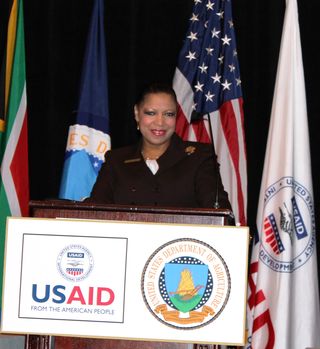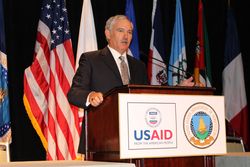
by Isabel Benemelis, deputy chief, FSA Public Affairs
USDA’s Farm Service Agency (FSA), working with other federal agencies and international organizations during fiscal year 2011, delivered to relief programs throughout the world approximately 1.8 million metric tons of grain and food products valued at nearly $1 billion.
That FSA plays a significant role in domestic and international food aid comes as a surprise to many industry observers. They are more familiar with the agency’s primary mission of providing a safety net to America’s farmers and ranchers — farm loans, farm programs and disaster assistance.
Telling its story was part of FSA Commodity Operations’ goal during “From Harvest to Basket: Weaving Together Agricultural Markets and Food Security,” the theme for the 2012 International Food Aid and Development Conference (IFADC) held in Kansas City, Mo., May 7-9, 2012.
In its 14th year, with more than 550 public and private sector participants from 20 countries, IFADC brought together two USDA sister agencies: FSA and the Foreign Agricultural Service (FAS); the U.S. Agency for International Development (USAID); private sector companies and voluntary non-governmental and international organizations. They collaborate throughout the year to provide America’s food aid and development assistance to the world’s neediest people.
IFADC serves as a central meeting place for policymakers and policy implementers and provides the opportunity for private voluntary, non-governmental or international organizations to link up with agricultural companies, trade associations, academia and the transportation industry to improve communication and cooperation.
“Our collaborative efforts are making a difference in eradicating food insecurity globally,” said Sandra Wood, FSA’s assistant deputy administrator for Commodity Operations. “While food insecurity continues to be a challenge, we must promote access through improved efforts in agricultural production, trade and safety nets when needed,” she added.
Wood served as mistress of ceremonies at this year’s IFADC. Her supervisor, James Monahan, deputy administrator for Commodity Operations, took pleasure in introducing Michael Scuse, the newly confirmed under secretary for Farm and Foreign Agricultural Services at the U.S. Department of Agriculture, and a principal speaker.

During his remarks, Scuse announced that FSA has established new rules designed to make U.S. food aid safer. “Starting on June 15, commodities purchased for food assistance programs will be stored or handled only by facilities licensed under the new Export Food Aid Commodity Warehouse Licensing Agreement,” said Scuse. The agreement was developed in response to sanitation and security concerns of food assistance suppliers. Well-received by the conference participants, the announcement demonstrates USDA’s commitment to improving the delivery of food assistance by constantly seeking new and innovative approaches. “From the moment USDA procures the commodities to the moment partners deliver them to recipients on the ground,” said Scuse, “we want to improve outcomes so they can be replicated and sustained.”
With public-private partnerships clearly surfacing as a focus in this year’s conference, Scuse said, “Partnerships, after all, are where the rubber meets the road. That’s why USDA is focused on strengthening our partnerships with international relief and development groups, as well as local and international companies. Relying on the knowledge and expertise of private-sector stakeholders allows USDA to leverage limited funding to make a broad and enduring impact.”
USDA’s partners provide development assistance as well as food aid to people in developing countries. This helps them become capable of feeding themselves and their communities, rejuvenates their agricultural sectors and increases their capacity to trade. Working with partners, USDA can link farmers and their cooperatives to local and international companies. This facilitates technology transfer and sustainable economic development and trade, exponentially increasing the value of our international development efforts.
“Working together, we can help developing countries become more food secure and resilient against adversity. As they unlock their economic potential and raise incomes, they become better trade partners with increasing demand for a wider variety of food and agricultural products,” said Scuse. “This creates new markets for U.S. agriculture, which ultimately creates jobs and benefits the U.S. economy as well.”
During the Tuesday plenary session, Under Secretary Scuse and Nancy Lindborg, the assistant administrator for the U.S. Agency for International Development, paid tribute to U.S. Representative Donald Payne, who served as a New Jersey Democrat in the U.S. House of Representatives from 1989 until his death. As head of the Congressional Black Caucus, founder of the Malaria Caucus, and member of the House Committees on Education and Foreign Affairs, “Representative Payne made a significant difference in the world and for his constituency, working tirelessly to restore democracy and promote human rights worldwide,” said Scuse. “He was a forceful advocate for the poor, both here at home and abroad. His strong support for USDA’s food assistance programs will long be remembered. Whether he was speaking out in support of domestic food stamp recipients or the McGovern-Dole International Food for Education and Child Nutrition program, Rep. Payne’s passion and commitment were evident. He will be remembered as a true statesman and humanitarian by all the people he touched.”
The keynote speaker this year was Robert L. Thompson, Ph.D. Thompson is a senior fellow at the Chicago Council on Global Affairs, Professor Emeritus at the University of Illinois at Urbana-Champaign, most recently holding the Gardner Endowed Chair in Agricultural Policy and is also a visiting scholar at Johns Hopkins School of Advanced International Studies. He also served as Assistant Secretary for Economics at the U.S. Department of Agriculture (1985-87).
Thompson examined the imminent global challenge of population growth that will increase food demand faster than agricultural production can grow. “World food demand will grow 70-80 percent by 2050, with a 40 percent increase from world population growth – from 7.0 to 9.6 billion – almost all in developing countries,” said Thompson.
He posed the question “how do we feed the world’s larger population, most of which will be in low income countries, better than today at reasonable cost without damaging the environment?” He also analyzed some added constraints to this challenge, like the availability of arable land, the shortage of water, the need to also produce biofuel feed stocks, the agriculturally important effects of climate change, and the decline in agricultural investment and foreign aid due to the struggling world economy. To address this challenge, Dr. Thompson emphasized what he called “the essential role of government in development,” of investing in agricultural research, and prescribed growing agricultural trade to provide greater trading opportunities to least-developed countries (LDCs). “With population growth and broad-based economic development in LDCs, growth in their food demand will outstrip production potential and more of world ag production will move through trade,” said Thompson. “Greater trading opportunities for LDCs would accelerate their economic growth and accelerate growth in their food consumption and imports.”
Among the other distinguished speakers at the 2012 IFADC were: the Republic of Congo’s Minister of Education Rosalie Kama-Niamayoua, Angola’s Ministry of Education National School Feeding Coordinator Domingos Torres, USAID’s Assistant Administrator Nancy Lindborg and Pioneer Hi-Bred President Paul Schickler.
To find out more about the Farm Service Agency’s role in domestic and international food aid, please see:
http://www.fsa.usda.gov/Internet/FSA_File/2012_ifadc_factsheet.pdf
http://www.fsa.usda.gov/Internet/FSA_File/foodasst_ccc_may2012.pdf





